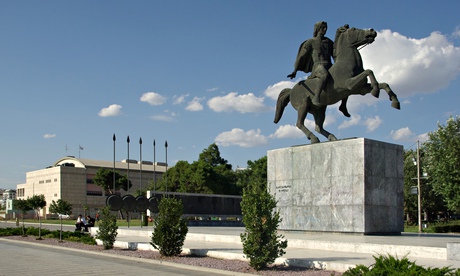A few days after choosing Mary Renault as the subject of this month's Reading group, I was listening to a few podcast interviews of Penelope Lively talking about her novel Moon Tiger. In one, Lively briefly got on to the subject of historical fiction, and noted: "I used to think that it was a debased genre."
There's no need for outrage from fans of the genre – Lively has clearly changed her mind. Although isn't it interesting that she once had such a negative impression? It's one that plenty of people must once have shared, if all the recent articles about the genre's resurgence are anything to go by. Since Hilary Mantel first won the Booker I've read dozens of articles about the apparently improving status of historical fiction. One of the best was by Hilary Mantel herself, in which she neatly sums up the opposition to "historical fiction":
"The term is beginning to look like an accusation, a stick to beat writers with: you're historical, you weaselly good-for-nothing, you luxury, you parasite. The accusation is that authors are ducking the tough issues in favour of writing about frocks. There is a certain strand of historical fiction of which this is certainly true; it is chick-lit with wimples."
It's lucky that Mantel put it so well, because, while I recognise this general feeling against historical fiction, I'm actually stumped to provide concrete evidence for it. When I searched for articles on the subject, I almost exclusively found material about serious historical fiction's renaissance , such as a Jay Parini article from 2009 on "how historical fiction went highbrow", and another from the same year in the Guardian about the "boom" that the genre is enjoying. My brief hunt brought up nothing of note on the other side. I suppose that is good news for fans of historical fiction – although I wouldn't blame them for feeling a little hard done by, or for feeling that this new boom is a journalistic construct. Was the genre really going through such hard times when Mary Renault was writing, for instance? There might have been plenty of look-at-the-clothes books around, but it could also be argued that it was reaching a high watermark. Not least because writers like JG Farrell, Willliam Golding, John Fowles and Barry Unsworth were also in operation. But then, you could possibly argue similar cases right through the 20th century, back to Ford Madox Ford's Fifth Queen trilogy, and then on to Dickens's Tale of Two Cities, Thackeray's Vanity Fair and Barry Lyndon. Maybe you could keep on making the same point until you get to Homer's stories of ancient heroes duking it out beneath the walls of of Troy.
The most likely truth is that historical fiction has always had something to offer. Mantel again puts it brilliantly (even if you might quibble her use of "modern"):
"The grumbling is aimed at literary fiction set in the past, which is accused of being, by its nature, escapist. It's as if the past is some feathered sanctuary, a nest muffled from contention and the noise of debate, its events suffused by a pink, romantic glow. But this is not how, in practice, modern novelists see their subject matter. If anything, the opposite is true. A relation of past events brings you up against events and mentalities that, should you choose to describe them, would bring you to the borders of what your readers could bear. The danger you have to negotiate is not the dimpled coyness of the past – it is its obscenity."
That quote must resonate for anyone who has been reading Fire From Heaven: a book published just two years after homosexual acts between two men were first decriminalised in the UK. The ancient Greek past was indeed a foreign country in those years. Going there gave Renault the freedom to present Alexander's passion for Hephaistion as the natural, unsurprising and simple matter of two people who happened to fall in love. Or perhaps "simple matter" is the wrong phrase. Good love stories are rarely simple, even if one of the lovers is as compliant and unremittingly adoring as the rather dull Hephaistion. No matter. The crux is that, because Renault so effectively conjures up a world of strange rites, foreign mannerisms, different values, and focuses in on the exceptional moral system of court life within that world, she is able to express plenty that might have shocked a few of her contemporaries.
But here I realise I'm reducing her exploration of the ancient world to an issue of 1960s social politics. Clearly it's an important part of the book, but Renault's feel for her setting goes far beyond its convenience for the love story. Her delight in Alexander's world and its dramatic potential is plain from the splendidly disconcerting shock of her opening sentence: "The child was wakened by the knotting of the snake's coils about his waist". It continues all the way to her exhaustive list of sources in her afterword via all those careful (but never overwhelmingly factual) descriptions of Macedonian drinking customs, military arrangements, court life, pedagogy, religious ceremonies, clothing and above all the emotional connections her characters have for this world (not to mention the numinous possibilities they see beyond their world).
This material is so vivid and so well presented that I'm not entirely surprised by the Emma Donoghue quote on the cover of my edition: "All my sense of the ancient world – its style, the scent of its wars and passions – comes from Mary Renault."
The part of me that spent three years reading Classics at university does want to prescribe Donoghue an improving course of Plato, Cicero, Catullus and Virgil. All historical novelists have to provide psychological character insight. But Renault has to go beyond that and create events and stories and characters, because we have so few facts about Alexander's early life. She makes up a great deal. That's not a criticism. It's her novelist's prerogative. Arguably, her best skill lies not so much in presenting the known facts as filling in the gaps between them. I just worry slightly that most of Doaghue's sense of the ancient world comes from Renault's imagination.
And yet, the classicist in me also has to admit (reluctantly!) that Renault clearly knew far more about ancient Macedon than I ever will. I find it hard to fault her on the known facts – and easy to admire her ability to create this immersive world. A world that feels real, with just that style and scent that appealed to Donoghue. Which brings me back to that superb Hilary Mantel article, where the two-time Booker prize-winner also writes: "The trade of the historical novelist doesn't seem so reprehensible or dubious; the only requirement is for conjecture to be plausible and grounded in the best facts one can get." That seems fair enough doesn't it? And on those terms, you could make a pretty strong case for Renault's world … Couldn't you?











